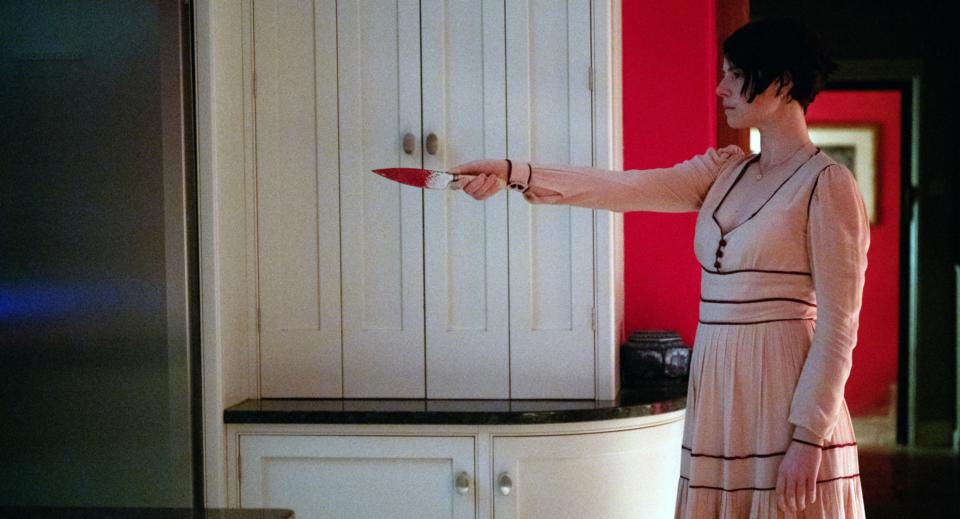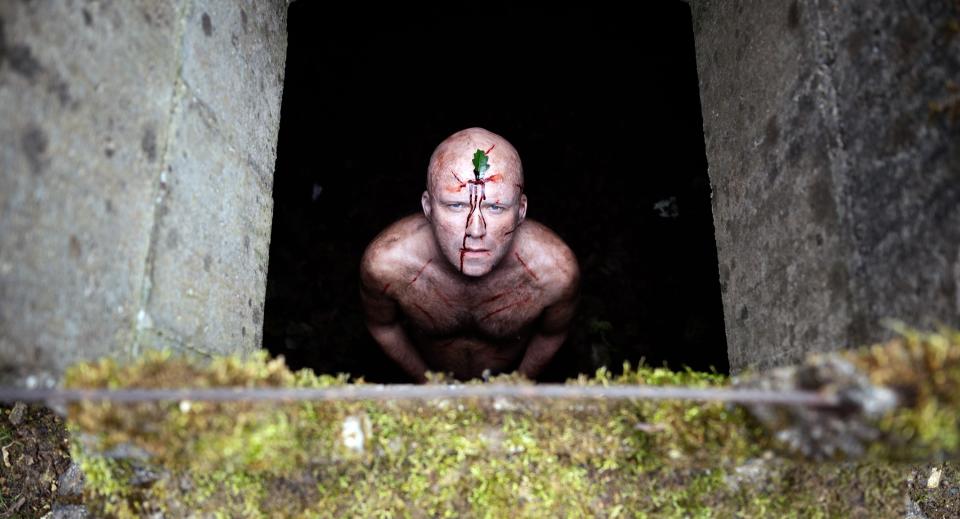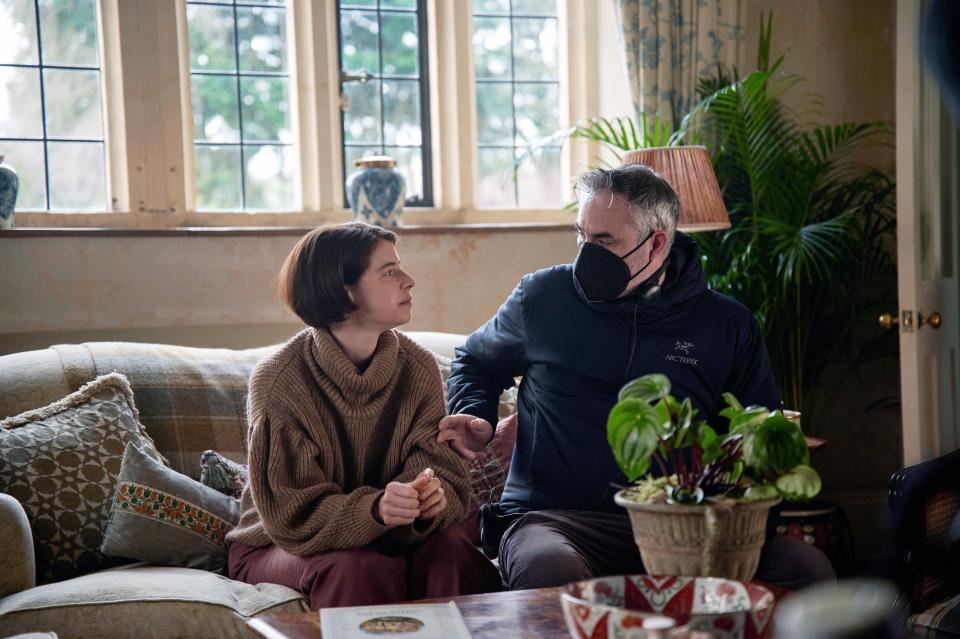Alex Garland Knows He’s Made the Most Inscrutable Movie of His Career with ‘Men’

Alex Garland’s latest mind-spinner is a movie called “Men,” about a woman being terrorized by one man who appears to represent all men, and it’s, of course, written and directed by a man.
Garland, ever the boldly-going screenwriter of films like “The Beach” and “28 Days Later” and director of decidedly uncommercial visions like “Annihilation” and “Ex Machina,” has made his most bewildering, inscrutable film yet. He’s also aware of the terrain he’s dipping into in telling an extremely contemporary horror story about the terror of public spaces women are forced to navigate. That setting, here, is the English countryside, and that woman is Jessie Buckley, playing a cipher of a person named Harper in a kind of one-woman horror show where she is the final girl from start to finish.
More from IndieWire
She’s on an inevitably ill-conceived solo vacation in an ensconced country home, reeling from the sudden violent death of her husband (Paapa Essiedu), whose exact nature is ever-shifting amid Garland’s puzzle-box editing: Did he jump from the roof of their London apartment complex? Did he fall accidentally? Did Harper somehow will him there? That’s what the men in this world — from the daffy groundskeeper Geoffrey to an emotionally manipulative vicar to the naked man stalking Harper in the garden — want her to believe. Oh, and they’re all played by Rory Kinnear.
The brazen on-the-noseness of that device will be lost on literally no sentient moviegoers in 2022, but Garland is toying with audience expectations of lightning rod topics like gaslighting and victim-blaming, which have become so de rigueur as to lose their currency. More so than even “Annihilation,” whose confounding final moments found biologist Natalie Portman facing up to an alien likeness of herself in a lighthouse appearing to refract human DNA, Garland delivers an unforgettably visceral ending that seems abstruse on its head, but that’s because he wants the audience to find their own patterns in his metaphysical clouds. (Look out for IndieWire’s fuller discussion of that ending with Garland later this weekend).
IndieWire spoke with Garland ahead of the film’s release while he’s in production in London on “Civil War,” his upcoming action movie also for A24 and starring Kirsten Dunst. In our conversation, he’s measured, self-deprecating, not so much doubting his art as much as his place in the conversations around them. “I kind of think I’m better off not doing interviews,” he said at one point. (He even told The New York Times recently that he’s considering leaving directing altogether.) This interview has been edited and condensed for clarity and length.

Courtesy Everett Collection
IndieWire: What I admired most about this movie is that what we’re seeing is the reality of the movie. This isn’t Harper’s hallucination — it’s her lived experience. There’s no Grand Guignol cop-out at the end where it’s all in her head. Was not pulling the rug out like this always the idea?
Alex Garland: There are different ways of interpreting the film or deciding what it’s about, but in terms of what I felt it was about, if it turned out to be all in her head, it would have made the film borderline unethical. There was never any intention to do that.
This is a movie called “Men” that hovers around the edges of a gaslighting thriller centered on a woman with themes that are extremely contemporary. Did you have this question or self-doubt about being a man telling this story?
No, not at all. That would be a weird position to take personally. It would be weird in a step-back way because I think one would get into a very strange space if you started to tell writers what they can and can’t write about. You can not read what writers write, but you want to be careful about telling people what they can and can’t write about.
More broadly, though, I would say that there’s an inference in that question that presupposes what the film is about and what it’s saying. If I said that, from my point of view, the film is about a sense of horror, but it’s about a sense of horror from the perspective of being a man, then why would there be a reason to not write about that even in accordance to the web, to the sort of strictures that have been implied that there are areas that one can and can’t write about? So even within that definition, I can’t really see why there would be a need to restrict the film.
So for example, to be clear about it, if I observe as a man a piece of behavior, or I read about a piece of behavior of another man, or if a thought floats through my own mind, or an impulse floats within me, that I feel a sense of horror about, why should I not be allowed to write about that? That makes no sense to me whatsoever.

Courtesy Everett Collection
Jessie Buckley is also the author of the film in many ways. In the weeks before filming, you, Jessie Buckley, and Rory Kinnear spent a lot of time talking and working out the movie’s themes.
No question. She had read the script, and she did what you always hope for, really, from all collaborators, but she did it in a really spectacular way, which is to offer up a set of thoughts and ideas and things she would like to do that I would not have been able to come up with myself.
That’s what I hunt for anyway in my filmmaking life in as much as that I’m not a kind of auteurist director who’s trying to keep control of everything within the frame. If anything, I’m trying to do the opposite, and delegate and give up as much as possible. So I would say Jessie is a sort of co-author, but that could also be read as a bit of virtue-signaling from me, that what I’ve done is given to this young woman authorship, specifically because of the nature of the story.
But actually, there’s also shared authorship between, say, Rory Kinnear, who like me is a middle-aged man, or the DOP [Rob Hardy] or the production designer [Mark Digby], the visual effects supervisor [David Simpson]. Jessie is one of those people, but does she have a voice in it? Absolutely. As the lead actor, she ends up clearly defining stuff that is very much her own. Whilst it’s a shared project, it’s also her own. That doesn’t just go to the interpretation of dialogue, it can extend to the dialogue itself, and also not just her own dialogue, but other people’s dialogue. So there are lines that the vicar speaks that are really from Jessie. They weren’t in the original script that she read.

Courtesy Everett Collection
Early in the movie, we see Harper go up to this tree, pluck an apple, and take a bite out of it. As an audience member, you’re immediately put in the realm of allegory, now wondering if Harper is less a person than a symbol. Why start out with such a recognizable biblical image?
It’s not specifically biblical as much as just one of a set of things, right? There are a whole bunch of things that are broadly recognizable to us. Now one of them might be plucking an apple from a tree, which has a kind of, yes, it’s got a sort of Adam and Eve reference, essentially. But another one might be, say, a contemporary buzz term, like victim-blaming. And what I’m doing is, I’m making an assumption that those two references — one of which is religious, and the other one is more contemporary, at least as a sort of two-word phrase — that people arrive at the film knowing about these things.
So it’s not like trying to point out something about Adam and Eve or the quote-unquote Original Sin or actually about victim-blaming or microaggressions or whatever else one might be choosing to include in it. It’s making assumptions that we know these things. It’s not listing them. It’s using that as a kind of launchpad for other stuff. I know it might not be seen like that, because I think that to some viewers, their interpretation will be bound to their own private sense of either the importance or lack of importance of biblical imagery. But I suppose my position is that I can’t really prevent that or worry about it too much. I think usually interpretations on films are more telling about the person doing the interpretation rather than the film itself.

Courtesy Everett Collection
You’ve said this movie is more about “feelings of horror” than a horror movie itself. Maybe you don’t want to be put in that box.
I really I’ve got no problem with that box. I probably didn’t explain what I was trying to say very well — which is usually why I kind of think I’m better off not doing interviews because I tend not to articulate things in the way I hope to articulate them.
What I was trying to say was closer to that thing we talked about earlier, which is it’s a horror film about a sense of horror. So it is a horror film. It uses all sorts of genre conventions and tropes and beats and in different kinds of ways. And structurally it’s really like a horror film. I don’t shy away from your labels. I kind of embrace them, to be honest.
What Harper is going through is not unlike being a spectator in a horror movie.
That would be my sense of it. Like a lot of real-world horror, I think what I was trying to do, sometimes at least, was to jam things up against each other. Like, the fact that some of these things are just fucking stupid. Some of them are overtly, utterly, terrifying and truly aggressive and truly violent. And some of them are really kind of pathetic and weak. I’m trying to sort of tonally have all those things set alongside each other.
A24 releases “Men” in theaters on Friday, May 20.
Best of IndieWire
From 'Barbie' to 'Babylon,' Here's Everything Margot Robbie Has in the Works
New Movies: Release Calendar for May 20, Plus Where to Watch the Latest Films
Every Palme d'Or Winner From the Cannes Film Festival, Ranked
Sign up for Indiewire's Newsletter. For the latest news, follow us on Facebook, Twitter, and Instagram.

 Yahoo Movies
Yahoo Movies 